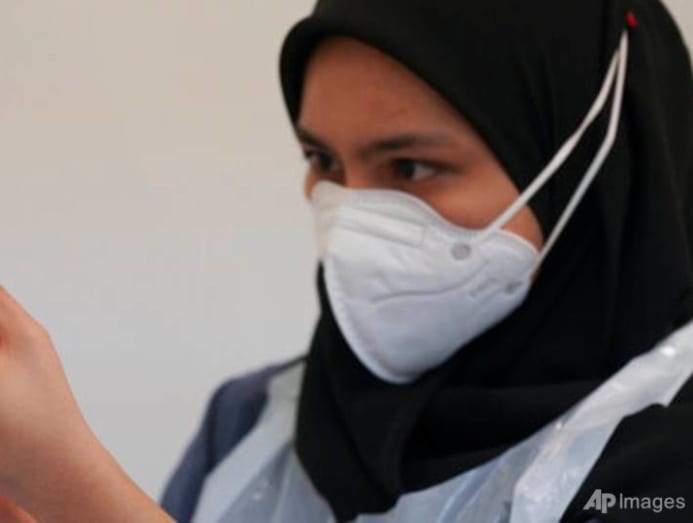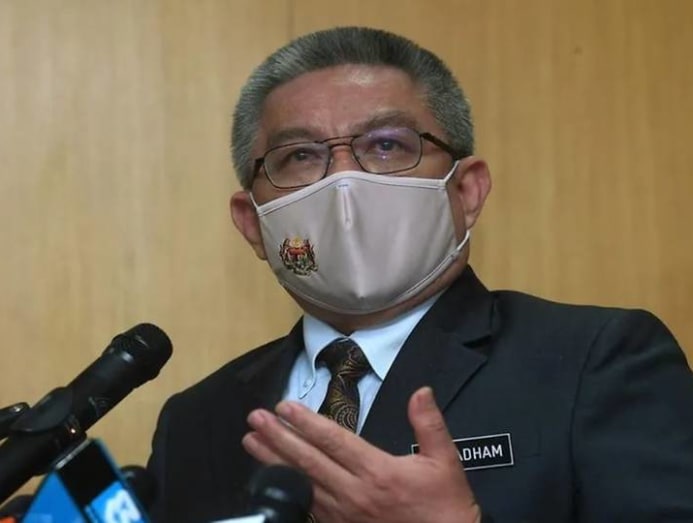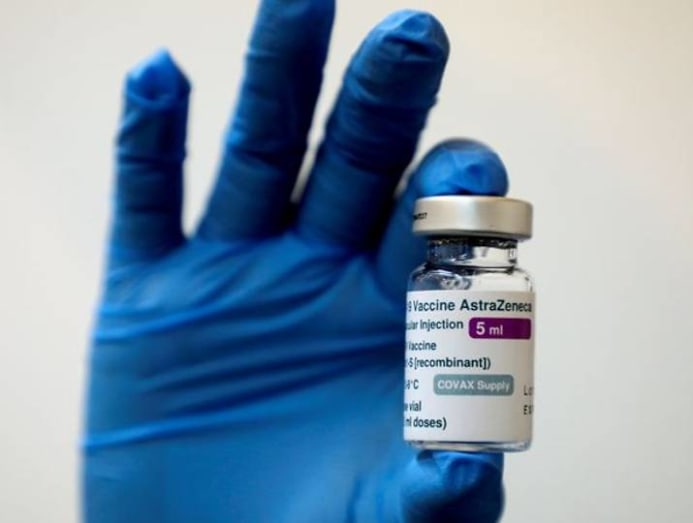Commentary: What’s behind no-shows in vaccination centres across Malaysia?
KUALA LUMPUR: There is much riding on Malaysia'south vaccination plan as the state fights its biggest wave of infections since COVID-19 became a full-fledged pandemic.
While the extended Motility Control Society (MCO) restrictions have been critical in getting new daily cases down to just beneath v,000 from a high of 9,020, these lockdowns are non a lasting solution when they have upended lives and destroyed livelihoods.
Frustrations regarding the futility of new rules and the poor regime response expressed over social media take been on the ascension, maybe leading the Agong to meet political parties over the past week and to later urge a reconvening of Parliament.
Malaysian rulers likewise issued a statement on Wed (Jun xvi) highlighting that they do non encounter a need for the state of emergency to be extended past Aug 1.
READ: Commentary: Volition Malaysian king take PM Muhyiddin'southward government to task for huge COVID-19 mess?
RAMPING Up VACCINATION KEY TO EXITING PANDEMIC
Prime Minister Muhyiddin Yassin knows millions of lives are on the line and his ain political survival hangs in the balance. He has therefore outlined a 4-phase COVID-xix exit plan, in which vaccinating 60 per cent of the Malaysian population past October is fundamental.
To ramp upward vaccination, five mega vaccination centres have been prepare upwardly effectually Kuala Lumpur, with more planned in Penang and Johor, Science Minister Khairy Jamaluddin announced two weeks ago.
A total of 300 more vaccination centres are planned to be open, with 16 1000000 doses expected to make it over the side by side two months, PM Muhyiddin pledged last calendar week. Mobile vaccination units will be deployed in nine states and automatic registration is even being considered in low-cal of technical bug.
While Malaysia had canonical three vaccines for apply in its National Immunisation Program (mRNA-based vaccine Pfizer-BioNTech, the Oxford AstraZeneca and Sinovac's CoronaVac), conditional approval has merely been given to China'south CanSino Biologics and US Johnson & Johnson on Tuesday (Jun 15).

Just while getting vaccination logistics right is essential to meeting this new surge programme, regime must likewise pay attention to public attitudes and hesitancy nigh vaccination.
PUBLIC CONCERNS ABOUT VACCINATION Amidst SWIRLING MISINFORMATION
In a survey by Ministry of Health Malaysia conducted in cease-December, 17 per cent of respondents said they were unsure of the vaccine. Up to 78 per cent of those in the uncertain group also had less confidence the vaccines would piece of work, while 71 per cent thought they would be unsafe for utilize.
About one in six said they would not agree to getting vaccinated, with over 96 per cent in this group citing side effects as the principal reason, while close to 85 per cent were suspicious of its ingredients.
READ: Worried about anaphylactic reactions and side furnishings? Experts reply FAQs on COVID-19 vaccination
Only two in 3 of the surveyed 212,000 said they would accept the COVID-xix vaccine.
Vaccine hesitancy has been especially high in low-income communities. More than than a third of those living in public housing projects in Kuala Lumpur (Projek Perumahan Rakyat) surveyed by the Un said they were unwilling to exist inoculated despite vaccination being free.
An ordinance that imposes the threat of fine and jail on those spreading misinformation was passed in May, which recognised that vaccine hesitancy were probable fuelled past an underground anti-vax movement using Facebook and WhatsApp that have fanned public anxiety.
Some of the myths perpetuated include the strange idea that the COVID-19 vaccine has a cloak-and-dagger tracker microchip implanted, that information technology changes people's DNA or that it has long-term effects on a women's fertility.
READ: Commentary: Privacy in a pandemic — can I enquire my GP if they've been vaccinated for COVID-19?
Then-called experts from a purported "Covid Research Eye" in Kuala Lumpur have likewise hijacked mainstream media late last yr to Malaysia's detriment.
They made false claims that COVID-19 can be dealt with by improving natural immunity through "herbal and other natural treatments" while creating fear past citing the U.s.a.' Food and Drug Assistants'southward study of two deaths in Pfizer's clinical trials, omitting the fact that the victims had died from diseases unconnected to the vaccine.
It does not assist when leaders like Gua Musang Member of Parliament Tengku Razaleigh Hamzah quote erstwhile-Pfizer-executive-turned-anti-vaxxer-hero Mike Yeadon's unfounded claims that COVID-19 vaccines were unnecessary as people globally are acquiring natural herd amnesty to the affliction.

Worse, such notions downplaying the severity of the pandemic were repeated by Malaysian Health Minister Dr Adham Baba who in one case claimed COVID-19 "doesn't like loftier temperatures" and advocated drinking warm water as a ways of prevention.
CONCERNS OVER SPECIFIC VACCINES
Amidst the vaccines currently in employ in Malaysia's National Immunisation Programme (NIP), Sinovac's CoronaVac has been the most controversial.
Some Malaysians view information technology as an inferior product compared to mRNA vaccines similar Pfizer-BioNTech's due to its poor efficacy levels and large variations of trial results.
There is also a fear that annihilation made in China lacks quality and prophylactic controls, and concerns whether these uncertainties have implications for its halal status when Saudi Arabia declared in May a list of vaccines pilgrims who aim to perform the haj should take - which excludes Sinovac. This is despite government like Defense force Minister Ismail Sabri taking great pains to reassure people information technology is prophylactic for Muslims.
READ: Commentary: Resurgent pandemic sparks unemployment crisis amidst Malaysia'southward nigh vulnerable workers
READ: Commentary: Johor city dwellers hit difficult by MCO but rural communities fare worse
Public attitudes at all-time remain mixed when some proponents view Sinovac to exist safer, as it uses the tried-and-true method of drawing off inactivated viruses, compared to mRNA vaccines and viral vector vaccines that employ relatively new technology.
Even then, Sinovac has seen amend luck than Oxford's AstraZeneca, initially removed from Malaysia's national immunisation programme in May after rare incidents of blood clots caused a public scare.
Although the authorities is contemplating reinstating AstraZeneca, with a conditional approval granted for vials manufactured in Thailand, for now, eligible Malaysians who desire this choice must opt in.

The government does not desire concerns over AstraZeneca to be a stumbling block when effectually 8,000 cancelled online vaccination registrations in May subsequently finding out the vaccine would exist part of the nationwide program.
NO-SHOWS AT VACCINATION CENTRES
Does vaccine make matter? That might exist the instance, every bit the reported disruption at a vaccination centre in Shah Alam Selangor by senior citizens who wanted to cull their COVID-19 on Jun eight demonstrated.
While those who refused the COVID-nineteen vaccine jabs would be placed back into the system and given new dates for their vaccination appointments, the spokesman warned of delays as people are non given a pick of vaccine.
It would be a pity if poor attitudes compound the big logistical challenges in getting more shots in arms. Already, 12,000 in Kelantan missed their appointment in May for a wide range of reasons, many of whom could not be contacted.
READ: Commentary: Malaysia needs more than the 'hammer' of lockdowns to go COVID-19 under command
Worryingly, the attendance rate among those who accept registered is nearly 80 per cent on average, Khairy highlighted concluding calendar week, meaning that even when people overcome their hesitancy to sign up, they might not fifty-fifty go down afterwards.
Regime seem to think employing the stick can work, with fines to discourage Malaysians from skipping their vaccination appointments, later more than than 52,000 no-shows in seven states in May. Officials are also considering the possibility of making vaccination compulsory.
READ: Commentary: Little wonder why Malaysians are angry over celebrity Neelofa'southward repeated COVID-19 breaches
READ: Commentary: Malaysians in lockdown coo over pictures of returning wildlife – but in that location's more than than meets the eye
EXITING THE PANDEMIC
There are no piece of cake answers in tackling these no-shows and the underlying vaccine hesitancy.
Earth Health System (WHO) Manager-General Tedros Adhanom Ghebreyesus identified such attitudes to be the key claiming backside fighting COVID-19 back in February 2022 earlier information technology became a pandemic when he said: "Nosotros're not merely fighting an epidemic; nosotros're fighting an infodemic"
Greater advice among authorities, healthcare experts and the public to tackle vaccine concerns and indications which vaccine would be employed by each vaccination eye people can book slots at, even if choice of vaccine is not given, can assist.
Malaysians demand to recognise that nosotros are in the midst of one of the worst pandemics in flesh's history. Our only conservancy from this disease is vaccination. Vaccinating as many people until Malaysia can reach herd amnesty is also the simply way to terminate more variants from appearing.
The clock is ticking every 2d. Permit'due south bear in mind that all electric current canonical vaccines can forbid serious disease, hospitalisation and death from COVID-xix.
(Listen to Malaysians in Sabah, Johor and Kuala Lumpur share how they take been coping fighting a new moving ridge of COVID-19 infections in Middle of the Thing podcast.)
Dr Vinod RMT Balasubramaniam is a molecular virologist and senior lecturer at Monash Academy Malaysia.
Source: https://cnalifestyle.channelnewsasia.com/commentary/commentary-whats-behind-no-shows-vaccination-centres-across-malaysia-285996
0 Response to "Commentary: What’s behind no-shows in vaccination centres across Malaysia?"
Postar um comentário